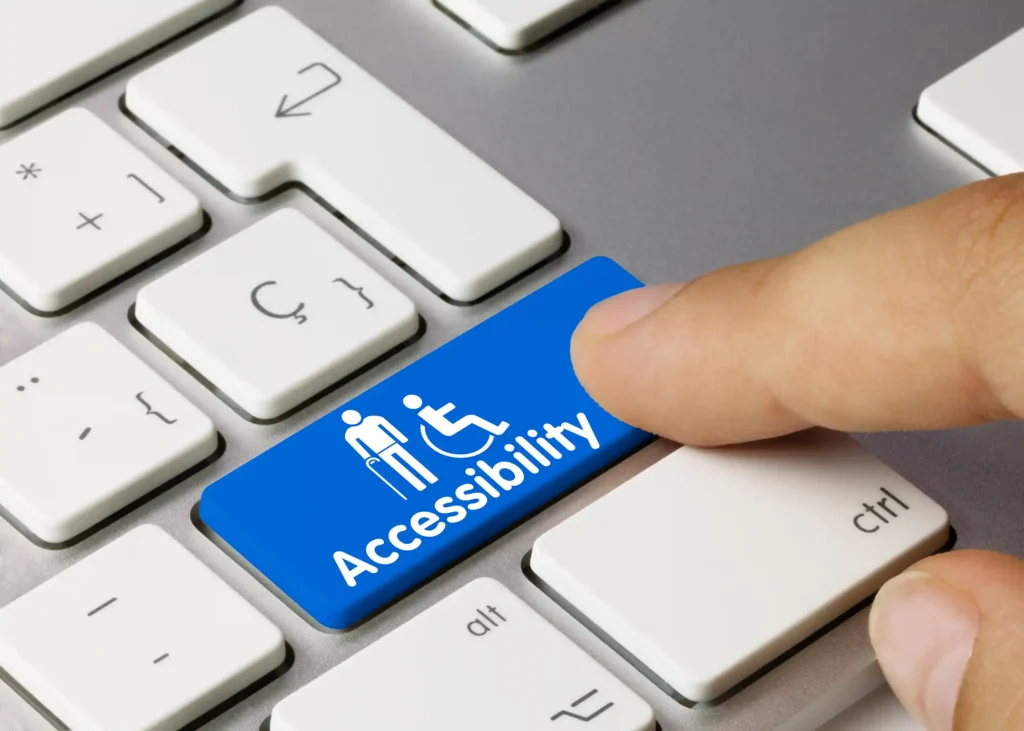Overcoming cultural barriers through
inclusive leadership

Barriers to building an inclusive culture
Fragmented efforts:
Accessibility is often siloed,
leading to inconsistent
practices, accessibility gaps,
and inefficiencies.
Cultural misalignment:
A lack of a unified values, leadership, and governance limits meaningful change, scalability,
and success.
Undefined cultural strategy:
Without a clear blueprint for change, organisations struggle
to roll out, embed, and
sustain accessibility.
98%
of websites
fail accessibility standards - ensure yours isn’t one
of them.
Scale accessibility, empower
your organisation
Compliance that protects your business and elevates your brand

Why transform your culture?
Align teams around a shared accessibility vision for accessibility efforts that
actually stick.- Future-proof your business
by making inclusion part of
your DNA. - Equip your people to lead accessibility with confidence, clarity, and consistency.
15%
the EU).
The EU Accessibility Act takes effect in June 2025 – are you prepared?
Shifting organisational values
Meeting standards today, building inclusivity for tomorrow
Culture diagnostics
Understand your organisation’s current culture, identify barriers, and set a foundation for transformation.
Leadership development
Equip leaders with the skills to champion accessibility, innovate, drive accountability, and inspire long lasting organisation-
wide change.
Procurement & compliance
We help you create accessible procurement policies, evaluate vendor risk, and meet legal requirements with confidence—reducing delays, liability, and future remediation costs.
How we work
From cultural shift to organisational growth
1. Discovery
Assess cultural readiness, articulate opportunities for change, and measure and define a baseline.
2. Strategic activation
of your organisation.
3. Leadership engagement
4. Employee enablement
efficiently into your teams everyday practices.
5. Governance integration
Establish ownership, workflows, and reporting structures for continued accessibility progress.
6. Cultural transformation
cultural shifts through transformational leadership
and governance structures.
The Arc impact
Discover how we’ve helped organisations overcome accessibility challenges and achieve success.
Let’s make accessibility compliance easy

FAQs
What is meant by inclusive leadership?
Inclusive leadership refers to a leadership approach that actively creates an environment where everyone feels valued, respected, and able to contribute fully, regardless of their differences. It goes beyond simply diversity in hiring; it’s about embedding inclusion into decision-making, policies, and everyday behaviours so it becomes part of how success is defined.
Inclusive leaders are passionate and committed to building a culture of inclusion that fosters belonging, drives collaboration, and supports meaningful culture change across an organisation.
Why do we need inclusive leadership?
We need inclusive leadership because it creates a culture that motivates team members to contribute to their fullest capabilities. Inclusive leaders build trust, encourage different perspectives, and ensure everyone feels valued and part of something.
This leadership approach not only strengthens decision-making and innovation, but also drives lasting culture change which integrates inclusion as a core part of organisational success.
In fast-changing markets, inclusive leaders can also help organisations to adapt more quickly by listening to diverse perspectives, responding to feedback, and building a psychologically safe environment.
What are the 5 C's of inclusive leadership?
The five C’s that represent the qualities of an inclusive leader are:
- Commitment
- Courage
- Curiosity
- Collaboration
- Cultural intelligence
Effective leaders also pair these traits with empathy and accountability, creating psychological safety and holding themselves responsible for incorporating inclusion at every level.
Drive inclusion in your organisation with our role-based inclusion training.
How do you measure inclusive leadership?
It can be measured through leadership assessments, employee feedback, and tracking organisational outcomes. Examples of measurements include team engagement, innovation, and a sense of belonging.
At Arc Inclusion, we use Culture Diagnostics to assess your organisation’s current culture, identify barriers to inclusion, and measure how effectively inclusive leadership is being integrated. This approach provides a clear roadmap for driving meaningful culture change.
We also recommend tracking tangible outcomes like improved retention, participation in initiatives, and progress against accessibility or digital inclusion KPIs to demonstrate long-term impact.